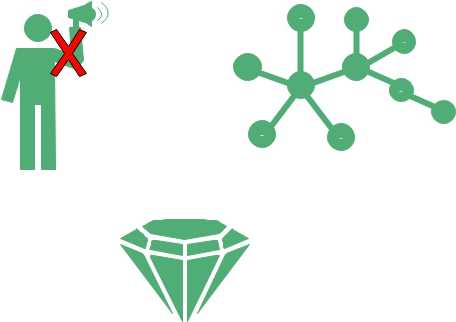How to recognize a predatory scheme
05 Mar, 2021Hey all!
I hope you’re well
I have recently met a few people who, I believe (an important distinction, as I can’t guarantee it), are part of pyramid schemes or similar scams. Those organizations make my blood boil, as they unfairly cheat people with integrity out of their time, dreams, and money for false hopes.
That being said, any organization is innocent until proven guilty. No organization is “right,” and neither is any organization “evil.” It’s always a balance of fairness, a spectrum. I am still not sure that the people I met are in a truly predatory scheme. However, I am judging it highly likely, because it raised many red flags. After asking questions verbally to highlight such red flags multiple times, I wanted to share them here. Some schemes learned to become more complex and more challenging to identify. If this article could help even one person out of or not get into such a predatory scheme, it would have been worth it.
I organized those questions in a dual trinity (yes, I am using that model again for its simplicity to remember). The first trinity is composed of three questions to ask yourself to help recognize predatory schemes. The second trinity is three disguises used as counter arguments to be wary of.
The first trinity, the three questions:
- Are you trading fairly?
- Are you both buying from and getting paid by the organization?
- Are you part of a secret society?
The second trinity, the three disguises
- We are not marketing aggressively
- It’s not a pyramid
- There is inherent value
Let’s start with the first trinity:
Are you trading fairly?
Fundamentally, a business is about trading something (A good, knowledge, a service, etc…) to someone (the customer), who in return delivers something to the business (E.g. money, time, services). Thus, are you getting your money’s worth? Are you getting value for whatever you are giving the organization? Tangible value, not just maybes, hopes, or possible outcomes. Pyramid schemes rely on low, entry-level participants getting less value than what they give for the higher level to have a net profit. It implies another question: if you acknowledge that this is how your organization works, would success be OK for you? Meaning if, even if, you end up on the positive side of the scale (E.g., you are getting more money out than you are giving in), are you delivering fair value to others in exchange for what you receive? To summarize, A) Are you receiving fairly for what you give? B) are you delivering fairly for what you receive?
To enter/grow in the business, you have to pay the business
It is a classic sign of pyramidal schemes. You are buying from the business until you can resell to/benefit from people who will enter the business. It can be a monthly subscription, an entry fee, buying specific products, etc. Are you part of an endless chain, where each piece relies on many additional links to make a return? A legitimate business will always pay you for the value you bring to it; if you are paying, it means you are the customer. Another way to look at it: In practice, are your gains primarily linked to the number of people in the business/ under you? (Are you encouraged to bring in people around you who will suffer a net loss by doing so? )
Are you in a secret society?
Pyramid schemes share a lot with secret societies. Secret societies
- claim to own special secrets;
- are exclusive;
- show a strong inclination to favor their members.
Pyramid schemes are preying on individuals and stealing money and time in exchange for false hopes. To do so, they need to
- Have a dream to sell, usually financial independence or easy wealth, that only they know how to achieve
- Then create a false feeling of exclusivity; the dream is not for anyone. It makes the victims feel exceptional, as well as making the knowledge more valuable. However, It usually turns out it’s not that hard to get into them.
-
Create a feeling of “us” vs. “them”. Predatory schemes are composed of two types of people: predators and victims. The latest mustn’t realize their status for them to work. To do so, the predators will attempt to sever trust outside the organization. Here’s how it could happen:
- preventing communication (“you can’t talk about it to others”, “they wouldn’t understand”),
- preventing help by saying outsiders are ill-intended (“they are just jealous and want you to fail”),
- Finally, posing as the only trustworthy partner (“But not us, us, we are with you, we want you to succeed). This is incredibly toxic and dangerous, as it leaves the victim isolated while digging his/her own grave.
Anyone should be able to explain how his/her organization works simply and want to do so. If you’re part of something that you don’t understand or that you can’t advertise/are not proud of, they’re something weird about it, to say the least.
None of those questions means for sure you are part of a pyramid scheme, but if many of them lead to uncomfortable answers, take some time to think about it.
Beware of disguises, the second trinity
Predatory schemes learned over time to “camouflage” themselves so that their victims would not detect them easily. Here are three to be wary of.
Non-aggressive marketing, or “We are not trying to recruit everyone”. It supposedly counters the perception of pyramid schemes where members aggressively recruit anyone, as they benefit from numbers. However, it makes sense; the scheme does not want anyone. They want victims who will fall for it, thus having a “selection” process. As a scheme owner, you do not wish to bring an aware sheep into the flock, who could lead others astray.
“It’s not a pyramid. I do not benefit from people who were recommended by people I recommended, and there’s no hierarchy.” A surprisingly simple yet effective trick. Pyramid schemes can take many shapes and forms, and the name is misleading. The point is not if you’re in a pyramid-shaped organization; the point is if you’re being taken advantage of.
“We do deliver/get value; it’s not just about getting people in”. Schemes can create a false impression of fair exchange (see question 1). Depending on what you are receiving for what you are paying, it can be a legit business or a scam. If you are buying “investments”, validate them. If you are being told you are investing in the organization into progressive ownership, ask to see your shares. In New Zealand, any owner of a business can easily see its percentages online in the registry.
Conclusion
If you are part of a predatory scheme, I understand you will not want to believe me, and I am not asking you to. You might be part of the next private circle that knows how to make money, and if it’s the case, I am genuinely happy for you and wish you the best. But that’s one of the typical traps with scams; it makes you want to believe in it, as there’s so much to win. Acknowledging them as such feels like losing all the “dreams” but actually saves you from the incoming nightmares; if you allow me the poetic license.
Stay safe out there. It’s a dangerous world, and the entrepreneurship journey is hard enough without others preying on it. Your time and money are valuable, don’t give them to anyone.
Thanks to Alistair for his early feedback :)
Here’s the Infographic for you to use and share, as summary:

